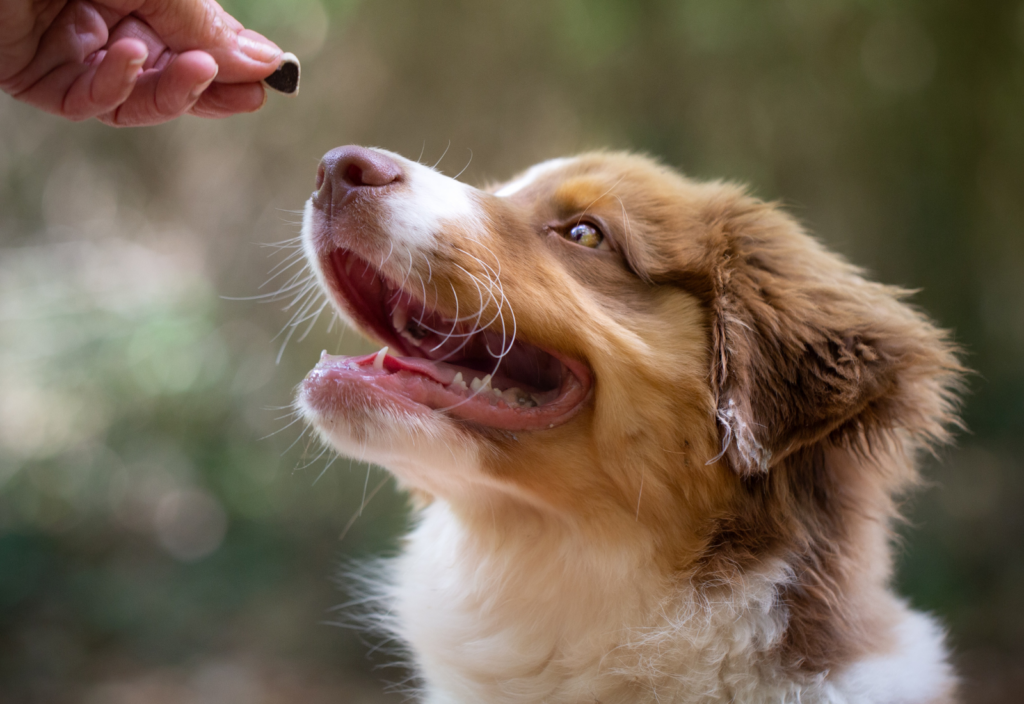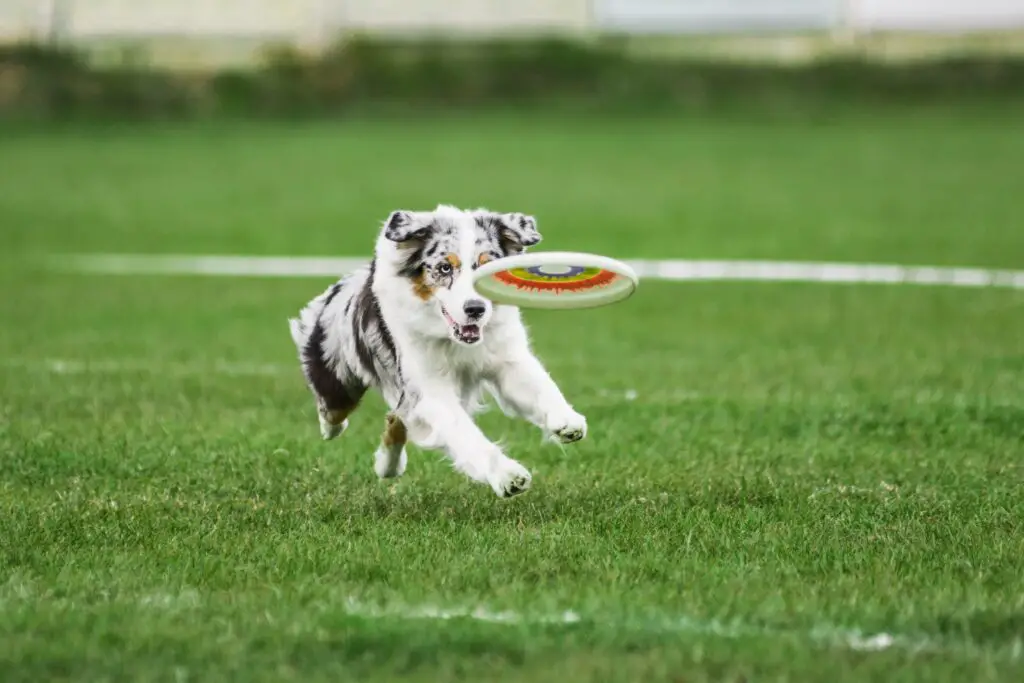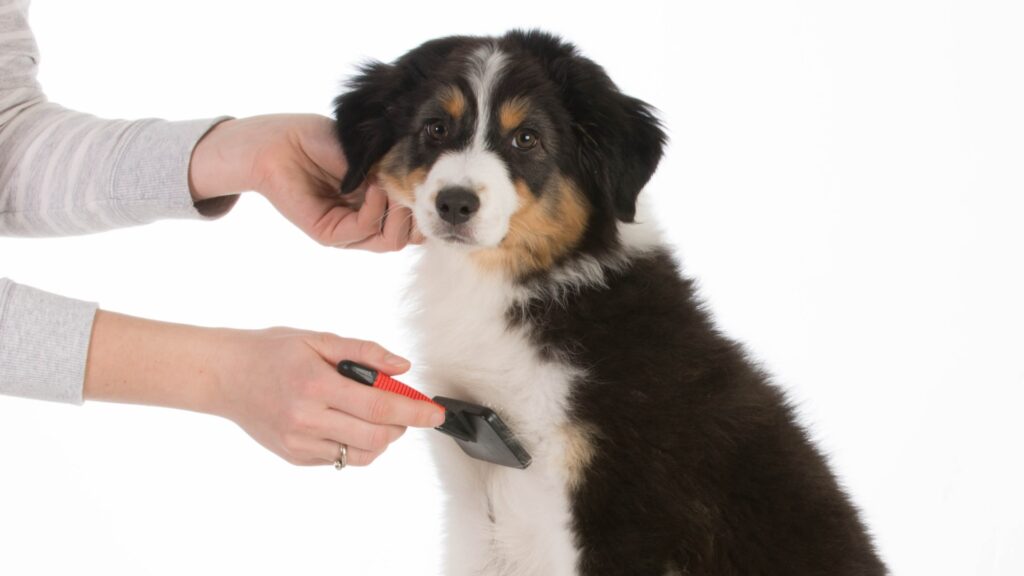The Australian Shepherd, also known as an “Aussie,” is a medium-sized dog that helps herd animals.
Despite its name, it actually comes from the United States, not Australia.
People often think this dog breed started in Australia, but that’s not true. They were created in the western part of the United States in the 1800s. Their ancestors were dogs from Europe, probably from a place called Basque, used by shepherds who moved to America.
Australian Shepherds are beautiful and smart dogs.
They have a coat of fur that is not too long and can be many different colors like black, blue with spots (blue merle), red with spots (red merle), and red. Their eyes can be blue, brown, or one of each color. They are strong and move very well. They also have a short tail that makes them easy to recognize.
Understanding the Australian Shepherd’s temperament
Australian Shepherds are known for their friendly and energetic personalities. They are highly intelligent and eager to please, making them easy to train.
They are also very loyal and protective of their families, which makes them excellent watchdogs. However, they can be wary of strangers and may be reserved or aloof until they feel comfortable.
In terms of behavioral tendencies, Australian Shepherds are known for their high energy levels and need for mental and physical stimulation.
They thrive in active households where they can participate in activities such as agility training, obedience trials, or herding trials. Without enough exercise and mental stimulation, they can become bored and develop destructive behaviors.
How affectionate are Australian Shepherds?
Australian Shepherds have a reputation for being affectionate dogs.
They form strong bonds with their owners and are often described as being “velcro dogs” because they like to be close to their humans at all times. They are known to be very loving and loyal, always eager to please their owners.
The level of affection displayed by an Australian Shepherd can vary from dog to dog. Some may be more reserved and independent, while others may be more clingy and demanding of attention.
Factors such as genetics, early socialization, and individual personality can all influence an Australian Shepherd’s capacity for affection.
The importance of socialization for Australian Shepherds
Socialization is crucial for Australian Shepherds to ensure they grow up to be well-rounded and confident dogs. Early socialization helps them develop positive associations with different people, animals, and environments. It also helps them learn appropriate behaviors and how to interact with others.
Without proper socialization, Australian Shepherds may become fearful or aggressive towards strangers or other animals. They may also exhibit anxious or reactive behaviors in new or unfamiliar situations. It is important to expose them to a variety of experiences from a young age and continue to provide ongoing socialization throughout their lives.
Tips for socializing an Australian Shepherd include introducing them to different people, animals, and environments in a positive and controlled manner. Gradually expose them to new experiences, rewarding them for calm and confident behavior. Enrolling them in puppy classes or obedience training can also provide opportunities for socialization.

How Australian Shepherds show affection
Australian Shepherds have various ways of expressing their love and affection towards their owners. Some common affectionate behaviors include:
1. Cuddling: Australian Shepherds are known for their love of physical contact and often enjoy cuddling up with their owners on the couch or in bed.
2. Following: They like to be close to their owners and will often follow them from room to room, wanting to be involved in whatever activity is happening.
3. Licking: Licking is a common way for dogs to show affection, and Australian Shepherds are no exception. They may give gentle licks as a sign of love and affection.
4. Leaning: Australian Shepherds may lean against their owners, using their body weight to show trust and seek comfort.
5. Eye contact: They often make direct eye contact with their owners, which is a sign of trust and a way to communicate their love and loyalty.
Australian Shepherds and their bond with their owners
Australian Shepherds are known for forming strong bonds with their owners. They are highly loyal and devoted, often becoming deeply attached to their human family members. This bond is formed through consistent training, positive reinforcement, and spending quality time together.
To maintain and strengthen the bond with an Australian Shepherd, it is important to provide them with plenty of mental and physical stimulation. Engage in activities such as obedience training, agility courses, or interactive play sessions. Regular exercise and playtime are also essential for keeping them happy and fulfilled.
Australian Shepherds and their behavior towards strangers
Australian Shepherds can be wary of strangers and may exhibit reserved or aloof behavior until they feel comfortable. This is a natural instinct for a herding breed that is protective of its family. However, with proper socialization and training, they can learn to be more accepting of unfamiliar people.
It is important to manage an Australian Shepherd’s behavior around strangers by providing positive experiences and gradually exposing them to new people in controlled environments. Reward calm and confident behavior when meeting new people and avoid forcing interactions if the dog is uncomfortable. It is also important to teach them appropriate boundaries and not allow them to become overly protective or aggressive towards strangers.

How to show affection to your Australian Shepherd
Showing love and affection to your Australian Shepherd is essential for maintaining a strong bond. Some ways to demonstrate affection include:
1. Physical touch: Petting, cuddling, and gentle massages can all help your Australian Shepherd feel loved and secure.
2. Verbal praise: Use positive reinforcement and praise to let your dog know when they have done something good. Verbal affirmations such as “good boy/girl” or “I love you” can also be comforting.
3. Quality time: Spend dedicated one-on-one time with your Australian Shepherd, engaging in activities they enjoy, such as playing fetch, going for walks, or training sessions.
4. Training and mental stimulation: Australian Shepherds thrive on mental challenges, so providing them with training exercises, puzzle toys, or interactive games can be a great way to show affection and keep their minds sharp.
5. Respect their boundaries: Just like humans, dogs have their own preferences and boundaries. Pay attention to your Australian Shepherd’s body language and respect their need for personal space when they indicate it.
Common misconceptions about Australian Shepherds and affection
There are some common misconceptions about Australian Shepherds and their affectionate nature. One misconception is that all Australian Shepherds are overly clingy or needy. While many Australian Shepherds do enjoy being close to their owners, individual personality and upbringing can greatly influence their level of affection.
Another misconception is that Australian Shepherds are always friendly towards strangers. While they can be friendly and sociable with proper socialization, they may also be reserved or wary of unfamiliar people. This is a natural instinct for a herding breed that is protective of its family.
Overall, are Australian Shepherds affectionate dogs?
Australian Shepherds are generally affectionate dogs that form strong bonds with their owners.
They are known for their loyalty, intelligence, and eagerness to please. However, the level of affection displayed by an Australian Shepherd can vary from dog to dog and is influenced by factors such as genetics, socialization, and individual personality.
Proper socialization from a young age is crucial for Australian Shepherds to ensure they grow up to be well-rounded and confident dogs. It is important to expose them to a variety of experiences and provide ongoing socialization throughout their lives.
Ultimately, the affectionate nature of an Australian Shepherd depends on the individual dog and the relationship they have with their owner. With love, patience, and consistent training, Australian Shepherds can become incredibly affectionate and loving companions.
If you’re interested in learning more about the Australian Shepherd’s affectionate nature, you might also want to check out this comprehensive guide on how much sleep a German Shepherd should have. Understanding the sleep needs of your furry friend is crucial for their overall well-being and can help foster a stronger bond between you and your pet. To read more about it, click here.
FAQs
What is an Australian Shepherd?
An Australian Shepherd is a medium-sized herding dog breed that originated in the Western United States. They are known for their intelligence, agility, and loyalty.
Are Australian Shepherds affectionate?
Yes, Australian Shepherds are known for being affectionate and loving towards their owners. They are often referred to as “velcro dogs” because they like to be close to their humans.
Do Australian Shepherds make good family pets?
Yes, Australian Shepherds can make great family pets. They are loyal, protective, and playful. However, they do require a lot of exercise and mental stimulation, so they may not be the best fit for every family.
Are Australian Shepherds good with children?
Yes, Australian Shepherds can be great with children. They are often very patient and gentle with kids, but as with any dog breed, it’s important to supervise interactions between children and dogs.
Do Australian Shepherds shed a lot?
Yes, Australian Shepherds are known for shedding quite a bit. They have a thick double coat that requires regular brushing to keep it healthy and reduce shedding.
Are Australian Shepherds easy to train?
Australian Shepherds are generally very intelligent and eager to please, which can make them relatively easy to train. However, they do require consistent training and socialization from a young age to prevent behavioral issues.





